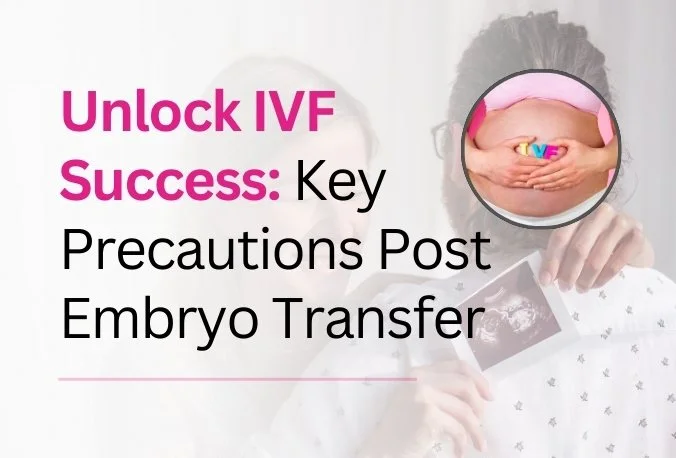Precautions after embryo transfer in IVF
– Published on 20 April 2024

For couples struggling with infertility, undergoing in-vitro fertilization (IVF) can be an emotional and daunting experience. After months of medication, monitoring, and egg retrieval procedures, the embryo transfer marks a crucial step towards achieving the dream of parenthood.
However, this is also a critical time when patients need to pay close attention to their health and follow certain precautions for the best chances of success.
In this blog post, we will discuss some important precautions that IVF patients should take after an embryo transfer to optimize their chances of implantation and ultimately a successful pregnancy. So read on to learn about these crucial measures for a successful IVF outcome.
Importance of Post Embryo Transfer Precautions
The period after embryo transfer in IVF treatment is often branded as the ‘two-week wait’, a time of anticipation and hope for couples. During this crucial juncture, certain precautions can make a difference between a successful or unsuccessful pregnancy. The embryo, once transferred, needs a receptive and nurturing environment to implant and develop.
It’s important to understand that the precautions are not just arbitrary rules,but are based on scientific understanding of how the body works and what it needs for an embryo to implant successfully.
Thus, these precautions are not merely about restricting or controlling one’s lifestyle, but rather about enhancing the conditions that favor implantation, growth, and the overall success of the IVF process.
Read more–IVF Success Rate
What to Expect After an Embryo Transfer?
Post-embryo transfer, patients often experience varying body responses, which can be quite individual. Some may notice mild cramping and spotting, which could potentially be signs of implantation. However, it’s essential not to stress over these symptoms, as their absence does not imply a failure of implantation.
Mild bloating and constipation could also be possible side-effects of progesterone supplementation, often used to support the luteal phase post-transfer.
The ‘two-week wait’ can be an emotionally challenging period, filled with anticipation and anxiety. It’s crucial to maintain a positive outlook and avoid taking pregnancy tests too soon, as they may not provide accurate results.
Your doctor is your best resource during this period. Regular medical follow-up and a good communication line with your healthcare provider can help alleviate any concerns and ensure you’re on the right path for a successful IVF journey.
Physical Activity and Rest Recommendations
Following an embryo transfer, it’s recommended to strike a balance between rest and mild physical activity. Overexertion should be avoided, yet it does not mean you’re required to be bedridden. Gentle walks and light housework can be beneficial in stimulating blood flow, without placing undue stress on the body.
However, certain activities are best avoided until confirmed pregnancy. These include high-impact exercises, weight lifting, and any strenuous activity that strains the abdominal region. Swimming and hot baths are discouraged as well, to prevent any risk of infection.
Rest is equally important. Ensure you’re getting sufficient sleep, as it aids in the body’s recovery and regeneration. It’s a good idea to use relaxation techniques such as deep breathing, meditation or gentle yoga to manage stress during the ‘two-week wait’.
Remember, these are general guidelines and individual circumstances can vary. Always consult with your IVF specialist for advice tailored to your specific needs.
Proper Nutrition for Successful Implantation
Proper nutrition plays an essential role in boosting fertility and supporting a successful implantation. A well-balanced diet rich in fruits, vegetables, lean proteins, and whole grains provides a broad spectrum of vitamins, minerals, and antioxidants essential for optimal reproductive health.
Particular attention should be directed towards foods rich in folic acid, such as leafy green vegetables, fortified breakfast cereals, and beans. Folic acid aids in the development of the neural tube of the baby and can help prevent major birth defects. Consuming a good amount of omega-3 fatty acids found in fatty fish, walnuts, and chia seeds can also support the implantation process.
Hydration is equally important during this period. Consuming a sufficient amount of water each day aids in maintaining optimal body function and promoting a healthy uterine environment.
On the other hand, you should avoid excessive caffeine and alcohol along with processed and high-sugar foods, as they may negatively impact your fertility.
It’s crucial to follow a nutrition plan that’s tailored to your specific dietary needs and health conditions. Consult a qualified nutritionist to create a personalized nutrition plan for your fertility journey.
Avoiding Harmful Substances and Environmental Factors
Avoiding harmful substances and certain environmental factors is equally important when trying to boost fertility and support successful implantation. Exposure to toxins, both in your personal environment and through certain lifestyle habits, can negatively impact fertility.
Tobacco and recreational drugs are well-known culprits that can significantly impact both male and female fertility. Passive smoking also poses a substantial risk, so it’s essential to maintain a smoke-free environment. Moreover, exposure to certain environmental hazards like high levels of air pollution, pesticides, and certain types of plastics may also affect fertility.
Maintaining a healthy body weight and managing stress levels through activities like yoga, meditation, or gentle exercise can help create a favorable environment for implantation.
Managing Stress during the Two-Week Wait
The two-week wait, the period between ovulation and the time you can take a pregnancy test, can be particularly stressful. Here are some practical tips to help manage your stress:
- Practice Mindfulness: Engage in activities that keep you in the present moment. This could include meditation, deep breathing exercises or simply taking a walk in nature.
- Stay Active: Regular exercise helps to reduce stress hormones and increase endorphin levels, promoting a positive mood.
- Eat a Balanced Diet: Consuming a nutritious diet helps maintain stable blood sugar levels, helping to regulate your mood and reduce anxiety.
- Connect with Others: Reach out to friends, family, or online fertility communities. Sharing your experiences can provide emotional relief and make you feel less isolated.
- Limit Internet Searches: While it’s tempting to look for early pregnancy symptoms online, it often leads to unnecessary anxiety. Try to resist the urge to self-diagnose.
- Pamper Yourself: Use this time to focus on self-care. Whether it’s reading a book, having a bath, or getting a massage, do something that makes you feel relaxed and happy.
Always remember, it’s completely normal to feel a mix of emotions during this period. If stress becomes overwhelming, consider seeking professional help.
If you need further guidance or have additional questions about navigating through this period, please do not hesitate to contact us. Our team of care specialists is readily available to provide you with the support you need during this trying time. Remember, you’re not alone in this journey, and we are here to help. Reach out to us at any time, and we will do our best to assist you.

By Dr Samidha Dalvi-Amale
IVF and Fertility specialist Medical Director- Pune IVF
